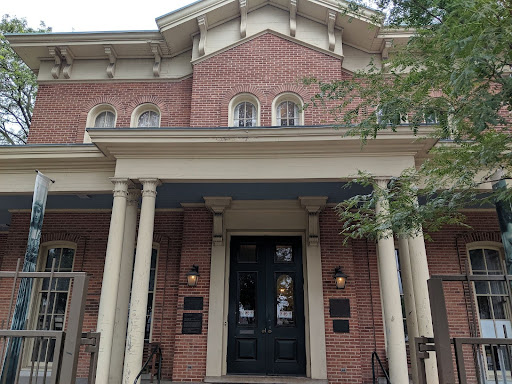Recent Posts
OPTIMA LAKEVIEW

Front steps at Hull House. Credit: Wwahammy on Wikimedia Commons, licensed under the Creative Commons Attribution-Share Alike 4.0 International license.
At Optima®, we remain committed to celebrating the rich history of the places where we build our communities. So for residents of Optima Signature® and Optima Lakeview® in Chicago, we are delighted to shine a light on one of the city’s pivotal landmarks in American social reform: Hull House. Founded in 1889 by social reformers Jane Addams and Ellen Gates Starr, Hull House became a central hub for addressing the pressing social issues of the time, especially for the waves of immigrants arriving in Chicago’s bustling urban center.
A Vision for Social Justice
The original Hull House was part of the settlement house movement, which sought to bridge the gap between the wealthy and impoverished by providing resources, education, and support to the underserved, particularly immigrants. Jane Addams, who would go on to become a Nobel Peace Prize laureate, envisioned Hull House as more than just a place for charity work—it was designed to be a community center that uplifted its residents through education, the arts, and advocacy for labor and women’s rights.
The settlement was located in the Near West Side of Chicago, a densely populated immigrant neighborhood at the time. As immigrants from countries like Italy, Greece, and Eastern Europe poured into the city, they found themselves living in difficult conditions, with limited access to health care, education, and stable employment. Addams and Starr recognized the potential for Hull House to offer a new kind of support—one rooted in dignity, empowerment, and self-sufficiency.
Services Offered at Hull House
Hull House quickly expanded to offer a wide range of services, becoming a cultural and educational hub in its community. At its height, Hull House consisted of 13 buildings that served a multitude of purposes. Here’s a look at some of the key programs offered:
- Educational Programs: Hull House offered free kindergarten, classes in English, vocational skills, and evening courses for adults. These programs were essential for immigrants seeking better employment opportunities and a path to integration in American society.
- Health Services: A significant concern for Hull House was the health and well-being of its community. The settlement provided access to healthcare and worked to improve sanitation in the neighborhood. Residents often benefited from visiting nurses and health classes.
- Recreational and Cultural Activities: Addams and her team believed in the power of the arts to inspire and uplift. Hull House hosted art exhibits, musical performances, and theater productions, giving residents both creative outlets and exposure to new cultural experiences.
- Advocacy for Labor Rights and Women’s Suffrage: Hull House became a platform for progressive reform. Jane Addams worked tirelessly to advocate for fair labor practices, child labor laws, and women’s suffrage. The settlement also became a meeting ground for discussions on workers’ rights and public health reforms, particularly with regards to housing and working conditions for women and children.
Legacy and Impact
As a shelter and a community center, Hull House became a model for social reform and an incubator for leaders in various movements. The work done at Hull House extended well beyond its walls, influencing national policy changes in labor rights, education, and public health.
Many prominent reformers, such as Florence Kelley and Julia Lathrop, began their work at Hull House. Kelley later became a key figure in the fight for child labor laws, while Lathrop became the first director of the U.S. Children’s Bureau. Hull House also had a profound effect on urban sociology and the study of immigrant communities, shaping how future settlement houses would operate.
Hull House Today
While the original Hull House building was demolished in 1963, the Jane Addams Hull-House Museum now stands as a monument to Addams’ pioneering work and the social impact of the settlement. The museum is located on the University of Illinois at Chicago campus and continues to educate visitors on the history of social reform and the ongoing relevance of Hull House’s mission in today’s world.
Visitors to the museum can explore exhibits that tell the story of the many immigrants, women, and reformers who walked through its doors, and the continuing work for social justice in contemporary society.
Hull House’s Enduring Legacy in Chicago and Beyond
Hull House represents a significant chapter in Chicago’s history while standing as a testament to the power of community-driven change and the importance of advocating for those who are most vulnerable in society. As a pioneer of modern social work, Jane Addams and her work at Hull House reflect values that still resonate today — values of equity, inclusion, and service that echo across Chicago and through Optima®’s commitment to enriching lives and fostering strong, supportive communities.
In commemorating Hull House, we honor the legacy of social advocacy and the architects of change who have shaped Chicago into the diverse, resilient city it is today. The principles of community engagement, support for underserved populations, and the transformative power of education are as vital today as they were over a century ago.
To plan your visit to Jane Addams-Hull House Museum, go to their website for info.

